With Love From Chicago: Unlikely Friendships and Photography
March 18, 2024
Text by Manfred Parrales with Marcus Muccianti
“While when I was young I gave myself the grace to spend a lot of time alone as a way of self-discovery working and taking photographs, it is also true that there is another type of loneliness that comes with age and is hard on a different level. The older you get it is more difficult to move to a place and make friends and that is another layer to the experience of loneliness that you can experience in your life.”
-Marcus Muccianti
Midwesterner in the Northwest. This is the most accurate description of Marcus Mucciante, a former environmental scientist from Chicago who left everything behind to start a new chapter of his life in Portland through the practice of photography.
What would a person from Chicago and I, a Costa Rican person, have in common? probably not much at first glance. But with Marcus, our paths crossed to discover a story of loneliness, self-discovery, and the practice of photography as a way to connect with others and with oneself. This is about unlikely friendships and photography.
He’s now one of my best friends in America. He feels like a very serious person. Lives in Northwest Portland. I am playful and silly, while Marcus has a serious demeanor and is from a cold, windy place.
Manfred Parales: Interviewing a friend can be a fascinating experience but also wow, what did you think when I told you, Marcus, it’s time to make your story a piece of art, I’m going to interview you. What was going through your head?
Marcus Muccianti: I was wondering what this was for? What was it about? Why did you choose me? I always have my own conclusions on why somebody does what they’re doing then I tried to think of a flurry of the questions that you’re going to ask me.
Manfred: Chicago is where it all started. What was your life like there and how that shaped your personality.
Marcus: It definitely comes from my childhood so opening up has always been a hard thing for me. So, yeah, there’s gonna be a bit of a facade there.,, It took some time for me to warm up to people. I grew up in a suburb just west of Chicago called Oak Park. When I was whatever age it was, and I had enough money, I moved out to Chicago and I lived there until I moved here to Portland. I see the differences between Chicago and Portland, aesthetically it’s different, geography of the area is different. Now Chicago is a place that I can never see myself returning to, honestly. Now I do love living out in the Pacific Northwest.
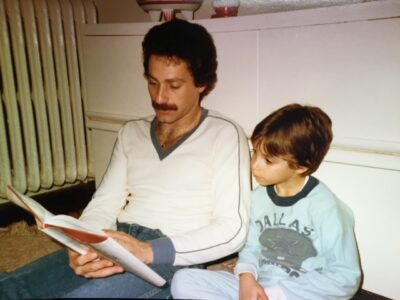
Manfred: I do love living out in the Pacific Northwest too. When was the first time that you heard about Portland? And why did you decide to move from Chicago to Portland?
Marcus: Honestly, the one memory I have of Portland is watching a TV show on our PBS network called Weird, it was like Weird Something, and they’d go across the country and find weird foods, and they had mentioned the donut shop Voodoo Donuts. I remember hearing about that like 10 or 15 years ago and saying I want to go out there. So, it piqued my interest about Portland but Portland wasn’t my first choice and it wasn’t the place I wanted to move to on the West coast. That was the Bay area.
I feel like I want to be a part of a gayborhood and an area that welcomed me. A place predominantly gay. You have the gay bars.I thought it’s like a very welcoming place and you don’t have to worry about being gay.
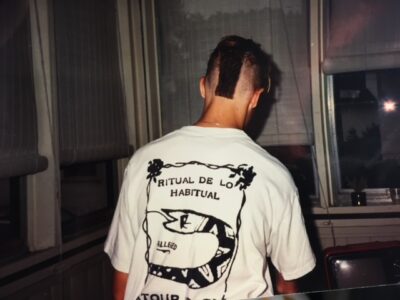
Manfred: Before coming to Portland did you try to live in any other place in the United States or abroad?
Marcus: No. Before moving to Portland I took about two weeks to visit both Portland and Seattle. And then after that I made my decision.
It made it a little bit easier because I did get a job offer here in Portland prior to moving. So I knew I had some financial stability moving here. Also I decided against Seattle because it felt a little too cosmopolitan. And I kind of wanted to get away from that, being from Chicago. So Portland had a totally different vibe than what I’m used to.
Manfred: One of the experiences when moving from one country to another, or in your case from the Midwest to the West Coast, is experiencing loneliness. How has your relationship with the experience of loneliness been when being new to a place?
Marcus: I moved here not knowing anybody. I did enjoy it in a way. I like having my solitude and exploring a new city on my own. That’s one of the reasons why I also didn’t move to Seattle. I was dating someone who lived in Seattle. I started dating him in Chicago, he moved to Seattle. When I was visiting both Portland and Seattle, he was there. I didn’t want his judgments to cloud where I wanted to move and how I felt about a city. I wanted to really kind of explore it on my own and make my own judgment calls on the city. There was a bit of loneliness in not knowing anyone but it allowed me also to explore on my own.
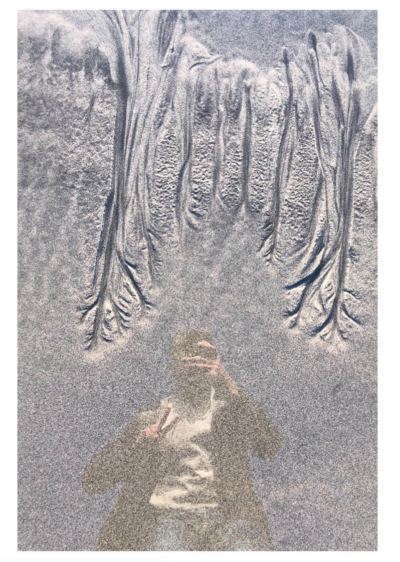
Manfred: The idea of your loneliness in a new city was something that empowered you. Was it an opportunity to bring to life a new phase of you?
Marcus: I was able to create my own experiences without somebody else clouding those for me or saying“Oh, this is what I love about this place because it reminds me of that.” I could experience those things on my own for the first time. I think I cherish those moments cause I didn’t have somebody else.
Manfred: In this process, what was something you learned, discovered or were surprised by during this new period of your life?
Marcus: Realizing how white Portland is when you’re here. I was in a restaurant in the Pearl District and I was looking out. I was eating alone. I was looking out and saw a black person walk by. That was my first understanding that Portland was a white city. That moment made me ask Why did I notice that just now? I didn’t think or know how white this city is compared to Chicago, which is more culturally and racially diverse than Portland and just now I noted. It made me wonder if instead of bringing more diversity to this city and just adding to the problem. It was a huge shock to me to find out that Portland is so white. Not as diverse as Chicago in that sense. Another thing that surprised me about Portland, in a more curious twist, was the amount of crows. The amount of crows in Portland is crazy.
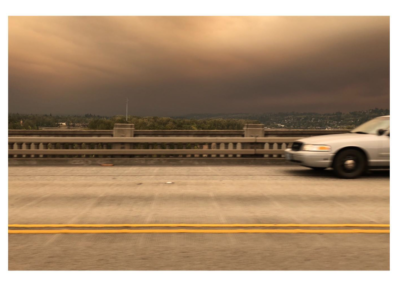
Manfred: Even though loneliness can be a means of empowerment there are times when it feels very heavy. How have you dealt with those moments?
Marcus: When those moments hit, that’s when I would go out in nature. Nature for me was a place where I can kind of gather my thoughts and be at peace where I was. I was particularly enjoying my new job here in Portland but it was really stressful and that was my only outlet.Getting in my car and going out into nature was something that helped me deal with that loneliness. Even though I was still physically alone in those moments I felt at peace being in nature.
Manfred: Talking about nature, there is an interesting intersection in your life where paths cross again. You studied environmental sciences but you have long dedicated yourself to photography, a path that we also share and which you have explored throughout the United States. What is the story behind that?
Marcus: My first job out of college was a contractor for the US Environmental Protection Agency (EPA) and a lot of what I did was travel and do oversight for contaminated sites. These sites were kind of barren and abandoned areas typically. My photography was based on these interesting abandoned places.
Whenever I was on a job site and I was suited up with a mask or my air tank I always can visually see a photo in my mind. After I would take all of that off, I would kind of try and go back and get those photos. Photography has always excited me. It was something that I could see in my mind’s eye, a photograph.Sometimes it didn’t work but it’s something that has always been like a common thread throughout my life that I’ve really enjoyed. Wherever I am in my life, regardless if it’s happy or sad, photography is something that I can rely on. I bought my first camera in 1996 on a road trip to Toronto and I’ve been taking photos ever since. I have been taking photography for almost 30 years.

Manfred: Do you have any interesting stories about photography?
Marcus: Here’s an interesting fact. I was going through some of my parents’ cabinets. They have old documents from when my brother and I were kids. My mom also held on to a bunch of photos that my grandfather took. My grandfather also loved photography which I didn’t really know about until later in life.
He also visited a lot of the same places I did in Chicago, like some nature places just outside of the city. It’s nice to have that connection and maybe feel like it was some kind of artistic genetic thing. I own some of my grandfather’s cameras and Polaroids.
Manfred: After these years, what is your reflection on loneliness?
Marcus: While when I was young I gave myself the grace to spend a lot of time alone as a way of self-discovery working and taking photographs, it is also true that there is another type of loneliness that comes with age and is hard on a different level. The older you get it is more difficult to move to a place and make friends and that is another layer to the experience of loneliness that you can experience in your life.
Manfred: Speaking of expectations versus reality, what advice would you give young Marcus?
Marcus: The advice I give myself is to continue to reach out and make those connections. I think I was really flippant in thinking that the people who were reaching out were going to continue to reach out. I’ve lost those connections.Very recently I’ve started reaching back out to those people I originally made connections to, hoping to rekindle that. Understanding now that it was something I probably should have worked a little bit harder on. don’t take those moments for granted.
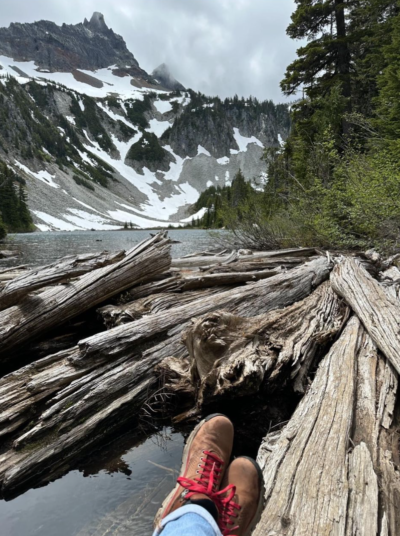
Manfred: If the Marcus of today could give any advice to the young Marcus 20 years ago, what advice would it be?
Marcus: Let’s start with gaining a smarter and better sense of self. I think moving away from my family lets me be who I truly am which can be scary too. After moving I lost friends in Chicago. It’s hard to keep that connection with long distance. It’s pretty difficult.
Manfred: By the way, did you ever try that place, Voodoo Donuts?
Marcus: It’s not that great. It’s probably my least favorite donut place here in Portland. I like Heavenly Donuts. I like the basics. I grew up with Dunkin Donuts so yeah, I like the basics.
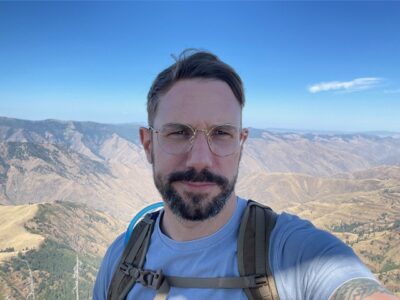
Marcus Muccianti (his/him), a Midwesterner in the Pacific Northwest, embodies a unique convergence of scientific expertise and artistic expression. Originally from Chicago, IL, Marcus’s journey led him to Portland. With over 8 years of dedicated experience in environmental protection and remediation, Marcus has established himself as a leader in the field. His academic foundation was laid at the University of Illinois at Chicago, where he earned a bachelor’s degree in Earth and Environmental Sciences, providing him with a robust understanding of the complexities of our natural world.
In addition to his scientific pursuits, Marcus has developed a passion for photography, exploring diverse genres such as landscape, portrait, architecture, and conceptual art. Through his lens, he combines scientific curiosity with artistic vision.
Currently, Marcus has focused on the real estate sector while continuing to pursue his photographic endeavors. He embraces every opportunity to wander into the landscapes of Oregon accompanied by his camera, documenting his vision of Oregon and the world.”
Manfred Parrales (his/him) In his interdisciplinary practice, Manfred often moves between art history, design, and social practice rather than conforming to traditional subject matter or individual expression of art. As a young Latino creator, he envisions art as a communal endeavor, transcending individual expression. He reimagines preconceived notions of art, constantly exploring new perspectives and creative avenues in a practice that embodies the idea of art as a catalyst for community engagement. This approach allows him to become an ‘accidental educator’, which ultimately makes his art practice an integration of art and life.


